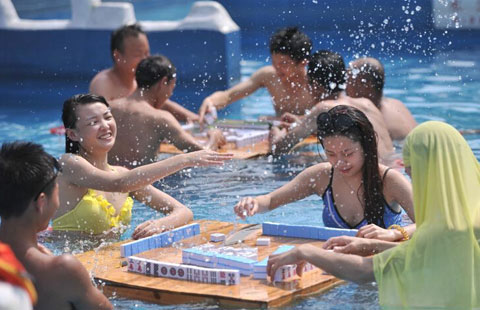Japan faces demographic timebomb
Updated: 2014-07-25 08:44
By Cai Hong (China Daily Europe)
|
|||||||||||

Bizarre suggestions by Japanese politician cause uproar but reflect urgency of population crisis
Censuses and all the surveys of Japanese people's relationships and marriages are pointing to a demographic crisis in Japan. A rapidly shrinking population is grabbing the headlines these days.
Japan has one of the highest longevity rates and one of the lowest fertility rates in the world. Japanese diaper manufacturer Unicharm's adult incontinence pants started outselling the diapers for babies in 2012.
A smaller, older population has alarmed Japan's central and local policymakers. They scratch their heads over solutions, and some come up with bizarre ones.
Tomonaga Osada, a member of the Shinshiro city assembly in Aichi prefecture, suggested in June that deliberately punctured condoms be distributed to married couples to increase the birth rate. Locally grown Japanese yams, which are believed to boost sexual stamina, were also in his proposal.
The recommendation that tried to intrude into bedrooms enraged local people so much that Osada got a stern warning from the assembly and apologized for his misguided attempt to turn city hall into "a nice and friendly place".
Shinshiro, a city with a population of some 49,000, is seeing its young people heading for big cities.
In May the think tank Japan Policy Council forecast that half of Japan's towns and villages would be empty of women of childbearing age within three decades.
Were Osada's madcap proposal executed, his country's population would not increase satisfactorily given that young Japanese are increasingly opting out of marriage, parenthood and even love-making.
A recent survey by the Meiji Yasuda Institute of Life and Wellness found that 40 percent of unmarried men in their 20s had never had a romantic relationship with a woman.
And more than two-thirds of unmarried women in their 30s were looking for a marriage partner who could pull in an annual income of at least 4 million yen, roughly $40,000, but less than a third of unmarried male respondents in their 30s earned that much.
A growing number of young Japanese men are deeming themselves as "herbivores" - a term coined by Japanese editor and columnist Maki Fukasawa in 2006 to describe straight men who have no interest in women or marriage. In the past 30 years, the number of unmarried Japanese men aged 30 to 34 has tripled.
Many of them choose to be a "herbivore" because they don't want to live the life their fathers lived as the breadwinners, or change their lifestyles to accommodate their stay-at-home wives and children.
More than 60 percent of Japanese women leave their jobs after having their first child, a rate that has remained unchanged for the past two decades. Many women can't find affordable childcare facilities that can keep infants all day and have no domestic help to turn to. Once married, they get no chance to be promoted as their bosses think they will take maternity leave.
Also, Japanese corporations' culture of long working hours, followed by compulsory after-work socializing, makes it difficult for married women to stay. It also leaves Japanese men little time to help their wives cook, clean or change nappies.
Statistics show that Japanese men, on average, spend only one hour a day with their children. So, child-rearing can, in some cases, prove an exhausting solo job for mothers.
Of all the Japanese women in the so-called "peak" child-bearing years from age 25 to 30, six out of 10 have never married.
Japan's National Institute of Population and Social Security Research estimates that the nation's population will shrink to two-thirds of the current 127 million in the next 50 years, and then to one-third 100 years from now.
Japan's land ministry projected on March 28 that depopulation will leave more than 60 percent of the country's total land mass uninhabited by 2050. The National Governors' Association declared on July 17 a "state of emergency" over Japan's declining birth rate.
Japanese Prime Minister Shinzo Abe has announced his resolve to keep the country's population above 100 million.
To this end, the Japan Policy Council has advised Abe that the average Japanese woman should have 2.07 children over her lifetime, up from the current 1.41.
But it is easier said than done.
Demography is hardly an exact science. Even demographers admit that a population projection 50 years into the future is a wild guess.
But Japan can't afford its population's steady downward spiral. If the current trend continues, 40 percent of its population will be 65 or over in 2060.
Unless there is a dramatic change in birth rate or the country's rigid immigration policy, a fast-shrinking working population will face the challenge of supporting a growing proportion of the old.
An increasingly smaller population is hard to square with Abe's notions of returning Japan to national greatness.
Abe is expected to appoint a state minister to prevent Japan's population from dropping and to reinvent rural areas when he reshuffles his cabinet in September.
"There is no magic bullet to stop depopulation," a Yomiuri Shimbun editorial said.
First and foremost, Japan needs to get its young people out of the celibacy syndrome, turning those "herbivores" into "carnivores". But there are no formulas for building chemistry between the two sexes, which is a personal thing.
Unless the government can figure out why its young people are so alienated from the bodies of the opposite sex, Japan's birth rate can hardly rebound.
The author is China Daily's bureau chief in Tokyo. Contact the author at caihong@chinadaily.com.cn
(China Daily European Weekly 07/25/2014 page12)
Today's Top News
TransAsia crash while landing in Taiwan
UK fraud office liaising with China on GSK bribery case
Death toll in Gaza mounts to 701
Meat supplier in global crisis
Dogs 'capable' of feeling jealousy
Five detained over stale meat scandal
5 more universities set up human rights centers
Rebels likely downed jet 'by mistake'
Hot Topics
Lunar probe , China growth forecasts, Emission rules get tougher, China seen through 'colored lens', International board,
Editor's Picks

|

|

|

|

|

|





